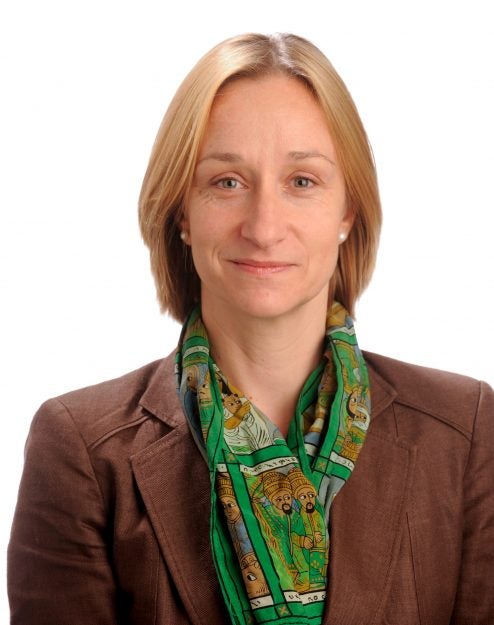“There is a growing recognition that children are not just adults in the making or mini-adults, but are themselves rights-holders.”
 This year Professor Cécile Aptel, a visiting professor at Harvard T. H. Chan School of Public Health and a fellow at Harvard FXB Center, will teach International Perspectives on Justice for Children as part of Harvard FXB Center’s Child Protection Certificate Program, which is undertaken in partnership with UNICEF. Professor Aptel, Professor of Practice of International Law at Tufts’ Fletcher School of Law and Diplomacy, is a recognized expert in the areas of international criminal justice, transitional justice, and child rights. Since 2010 she has served as the senior legal policy advisor in the Office of the UN High Commissioner for Human Rights in Geneva. Below, Professor Aptel reflects on her career in the field of child protection and makes a case for the importance of professionalizing this emerging sector through curricular development and certification.
This year Professor Cécile Aptel, a visiting professor at Harvard T. H. Chan School of Public Health and a fellow at Harvard FXB Center, will teach International Perspectives on Justice for Children as part of Harvard FXB Center’s Child Protection Certificate Program, which is undertaken in partnership with UNICEF. Professor Aptel, Professor of Practice of International Law at Tufts’ Fletcher School of Law and Diplomacy, is a recognized expert in the areas of international criminal justice, transitional justice, and child rights. Since 2010 she has served as the senior legal policy advisor in the Office of the UN High Commissioner for Human Rights in Geneva. Below, Professor Aptel reflects on her career in the field of child protection and makes a case for the importance of professionalizing this emerging sector through curricular development and certification.
What brought you to the field of child protection?
One of my first summer jobs as a student was working with a group of girls who were placed in an institution as a result of court rulings, in France. Most of these girls had been placed there because their parents or caretakers were serving prison sentences. A young girl had been taken away from her family because she had been sexually abused by her mother’s partner. All of them were in great need of attention and care, and each of them taught me a lot about life and responsibilities. I realized at once that children are both vulnerable and resilient.
I had first-hand experience again with this amazing combination of vulnerability and resilience after I finished my studies and took up my first real job working in the former Yugoslavia, which was then devastated by war. Snipers aimed at children queuing to get bread in the streets of Sarajevo. Not only do children suffer alongside adults during armed conflicts, they are also at times deliberately targeted. By killing children, one devastates their family, their friends, their entire communities. Child protection issues have been a constant part of my life ever since these early experiences.
How has the field changed over the years? What do you see as its greatest opportunities and challenges?
The very fact that we speak of child protection as a field shows how far we have progressed. It bears testimony to the increasing importance granted to children and to that which affects them, across societies and regions of the world. There is a growing recognition that children are not just adults in the making or mini-adults, but are themselves rights-holders. There is also a growing interest in ensuring that their views and perspectives are considered in various other fields, such as transitional justice.
The field of child protection is by nature multidisciplinary and interdisciplinary: it takes medical doctors, public health specialists, educationists, lawyers, etc., to best inform child protection policies and to suitably implement them. Ensuring that all the different actors work together across disciplines to determine, in each case, what is in the best interest of the children concerned – this remains a challenge.
Among the greatest opportunities in the advancement of child protection is the focus on girls, their specific vulnerabilities and also their needs, notably in situations of armed conflict. Malala Yousafzai, who stood up for her rights and now advocates for the rights of others, is a shining example of the strength and courage of girls.
But her story takes me to a tremendous challenge for child protection: attacks against pupils, their teachers and schools. We must decisively mobilize against such attacks, and we must also rally to ensure that education is a priority, even during conflict. It is estimated that today one in four children who live in areas affected by conflict is out of school. This is staggering.
Formal mechanisms for protecting children on an international scale are nothing new. What is necessary to professionalize the child protection sector at this time? What would a fully professionalized child protection field look like?
Professionalizing the child protection sector is key to giving this sector greater profile, and hence priority on global policy and development agendas. Programs like the interdisciplinary graduate program in child protection at Harvard FXB Center play an important role in ensuring that child protection professionals are adequately equipped to engage in rigorous research, implementation, monitoring and evaluation of child protection programs and policies. Its curriculum aims to enhance the capacity of current and future child protection professionals and expand the cadre of qualified child protection field workers and policymakers.
Related Resource
- A First of Its Kind Measure to Protect Children
- Harvard FXB-UNICEF Child Protection Certificate Program

